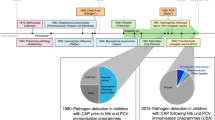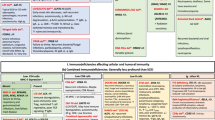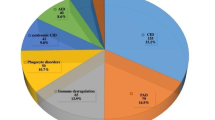Abstract
Background
Enzyme replacement therapy (ERT) for infantile-onset Pompe disease has been commercially available for almost 10 years. We report the experience of its use in a cohort treated at three specialist lysosomal treatment centres in the UK.
Methods
A retrospective case-note review was performed, with additional data being gathered from two national audits on all such patients treated with ERT. The impact on the outcome of various characteristics, measured just prior to the initiation of ERT (baseline), was evaluated using logistic regression.
Results
Thirty-three patients were identified; 13/29 (45 %) were cross-reactive immunological material (CRIM) negative, and nine were immunomodulated. At baseline assessment, 79 % were in heart failure, 66 % had failure to thrive and 70 % had radiological signs of focal pulmonary collapse. The overall survival rate was 60 %, ventilation-free survival was 40 % and 30 % of patients were ambulatory. Median follow-up of survivors was 4 years, 1.5 months (range 6 months to 13.5 years). As with previous studies, the CRIM status impacted on all outcome measures. However, in this cohort, baseline failure to thrive was related to death and lack of ambulation, and left ventricular dilatation was a risk factor for non-ventilator-free survival.
Conclusion
The outcome of treated patients remains heterogeneous despite attempts at immunomodulation. Failure to thrive at baseline and left ventricular dilation appear to be associated with poorer outcomes.

Similar content being viewed by others
References
Bali DS, Goldstein JL, Banugaria S et al (2012) Predicting cross-reactive immunological material (CRIM) status in Pompe disease using GAA mutations: lessons learned from 10 years of clinical laboratory testing experience. Am J Med Genet C Semin Med Genet 160:40–49
Banugaria SG, Prater SN, Patel TT et al (2013) Algorithm for the early diagnosis and treatment of patients with cross reactive immunologic material-Negative classic infantile pompe disease: a step towards improving the efficacy of ERT. PLoS One 8:e67052
Banugaria SG, Prater SN, Ng YK et al (2011) The impact of antibodies on clinical outcomes in diseases treated with therapeutic protein: lessons learned from infantile Pompe disease. Genet Med 13:729–736
Baruteau J, Broomfield A, Crook V et al (2014) Sucessful Densitisation in a patient with CRIM-Positive Infantile Onset Pompe disease. JIMD Rep 12:99–102
Byrne BJ, Kishnani PS, Case LE et al (2011) Pompe disease: design, methodology, and early findings from the Pompe Registry. Mol Genet Metab 103:1–11
Case LE, Bjartmar C, Morgan C et al (2015) Safety and efficacy of alternative alglucosidase alfa regimens in Pompe disease. Neuromuscul Disord 25:321–332
Chakrapani A, Vellodi A, Robinson P et al (2010) Treatment of infantile Pompe disease with alglucosidase alpha: the UK experience. J Inherit Metab Dis 33:747–750
Chien YH, Chiang SC, Zhang XK, Keutzer J, Lee NC, Huang AC, Chen CA, Wu MH, Huang PH, Tsai FJ, Chen YT, Hwu WL (2008) Early detection of Pompe disease by newborn screening is feasible: results from the Taiwan screening program. Pediatrics 122:e39–e45
Fukada T, Ewan L, Bauer M et al (2006) Dysfunction of endocytic and autophagic pathways in a Lysosomal Storage Disease. Ann Neurol 59:700–708
Hahn A, Praetorius S, Karaboul N et al (2015) Outcome of pateints with classical Infantile Pompe disease receiving enzyme replacement therapy in Germany. JIMD Rep 20:65–75
Hamdan MA, Almalik MH, Mirghani HM (2008) Early administration of enzyme replacment therapy for Pompe disease; Short term follow-up results. JIMD Short Rep 31:S431–S436
Hers HG (1963) Alpha-Glucosidase deficiency in generalized glycogen storage disease (Pompe’s disease). Biochem J 86:11–16
Kampmann C, Wiethoff CM, Wenzel A et al (2000) Normal values of M mode echocardiographic measurements of more than 2000 healthy infants and children in central Europe. Heart 83:667–672
Khoury PR, Mitsnefes M, Daniels SR, Kimball TR (2009) Age-specific reference intervals for indexed left ventricular mass in children. J Am Soc Echocardiogr 22:709–714
Kishnani PS, Hwu WL, Mandel H, Nicolino M, Yong F, Corzo D (2006) A retrospective, multinational, multicenter study on the natural history of infantile-onset Pompe disease. J Pediatr 148:671–676
Kishnani PS, Corzo D, Nicolino M et al (2007) Recombinant human acid [alpha]-glucosidase: major clinical benefits in infantile-onset Pompe disease. Neurology 68:99–109
Kishnani PS, Corzo D, Leslie ND et al (2009) Early treatment with alglucosidase alpha prolongs long-term survival of infants with Pompe disease. Pediatr Res 66:329–335
Kishnani PS, Goldenberg PC, DeArmey SL et al (2010) Cross-reactive immunologic material status affects treatment outcomes in Pompe disease infants. Mol Genet Metab 99:26–33
Kroos MA, Waitfield AE, Joosse M et al (1997) A novel acid alphaglucosidase mutation identified in a Pakistani family with glycogen storage disease type II. J Inherit Metab Dis 20:556–558
Kroos M, Pomponio RJ, van Vliet L, Palmer RE, Phipps M, Van der Helm R, Halley D, Reuser A (2008) GAA Database Consortium: update of the Pompe disease mutation databasewith 107 sequence variants and a format for severity rating. Hum Mutat 29:E13–E26
Lang RM, Bierig M, Devereux RB et al (2005) Recommendations for chamber quantification: a report from the American society of echocardiography’s guidelines and standards committee and the chamber quantification writing group, developed in conjunction with the European association of echocardiography, a branch of the European society of cardiology. J Am Soc Echocardiogr 18:1440–1463
Nicolino M, Byrne B, Wraith JE et al (2009) Clinical outcomes after long-term treatment with alglucosidase alfa in infants and children with advanced Pompe disease. Genet Med 11:210–219
Prater SN, Patel TT, Buckley AF et al (2013) Skeletal muscle pathology of infantile Pompe disease during long term enzyme replacment. Orphanet J Rare Dis 20:90
Raben N, Jatkar T, Lee A et al (2002) Glycogen Stored in skeletal but not in cardiac muscle in Acid-Glucosidase mutant (Pompe) mice is highly resistant to transgene-encoded human enzyme. Mol Therapy 6:601–608
Raben N, Wong A, Ralston E (2012) Myerowitz: Autophagy and mitocondrial in Pompe disease: nothing is so new as what has been forgotten. Am J Med Genet 15:13–21
Raval KK, Tao R, White BE et al (2015) Pompe Disease Results in a Golgi-based Glycosylation Deficit Human Induced Pluripotent Stem Cell-derived Cardiomyocytes. J Biol Chem 290:3121–3136
Reuser AJJ, Kroos MA, Hermans MMP et al (1995) Glycogenosis type II (acid maltase deficiency). Muscle Nerve Suppl 3:S61–S69
Slonim AE, Bulone L, Goldberg T et al (2007) Modification of the natural history of adult-onset acid maltase deficiency by nutrition and exercise therapy. Muscle Nerve 35:70–77
Su J, Sherman A, Doerfler PA et al (2015) Oral delivery of Acid Alpha Glucosidase epitopes expressed in plant chloroplasts suppresses antibody formation in treatment of Pompe mice. Plant Biotechnol J 13:1023–1032
Van den Hout HM, Hop W, van Diggelen OP et al (2003) The natural course of infantile Pompe’s disease: 20 original cases compared with 133 cases from the literature. Pediatrics 112:332–340
van Gelder, Hoogeveen-Westerveld C, Kroos MA et al (2015) Enzyme therapy and immune response in relation to CRIM status: the Dutch experience in classic infantile Pompe disease 38:305–314.
Wang Z, Okamoto P, Keutzer J (2014) A new assay for fast, reliable CRIM status determination in infantile-onset Pompe disease. Mol Genet Metab 111:92–100
Author information
Authors and Affiliations
Corresponding author
Ethics declarations
Conflict of interest
Alexander Broomfield funding for travel from Genzyme Corporation, UK (A Sanofi company) as well as Biomarin Corporation. Simon Jones has received speaker honoraria and funding for travel from Genzyme Corporation, UK (A Sanofi company) and Biomarin, as well as a research grant from Genzyme Corporation, UK. Katie Harvey and Emmaline Cullen have received research grants from Genzyme Corporation, UK. Joan Fletcher receives funding from Genzyme Corporation UK.
James Davison, Niamh Finnegan, Matthew Fenton, Ashish Chikermane, Catherine Stewart, Saikat Santra, Suresh Vijay, Mike Champion, Lara Abulhoul, Stephanie Grunewald, Anupam Chakrapani, Maureen Cleary and Ashok Vellodi declare they have no conflict of interest.
Informed consent
All procedures followed were in accordance with the ethical standards of the responsible committee on human experimentation (institutional and national) and with the Declaration of Helsinki of 1975, as revised in 2000. Informed consent was obtained from all living patients or their parents for study inclusion.
Additional information
Communicated by: Robin Lachmann
Rights and permissions
About this article
Cite this article
Broomfield, A., Fletcher, J., Davison, J. et al. Response of 33 UK patients with infantile-onset Pompe disease to enzyme replacement therapy. J Inherit Metab Dis 39, 261–271 (2016). https://doi.org/10.1007/s10545-015-9898-5
Received:
Revised:
Accepted:
Published:
Issue Date:
DOI: https://doi.org/10.1007/s10545-015-9898-5




